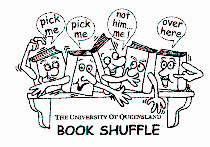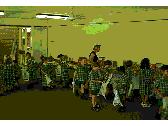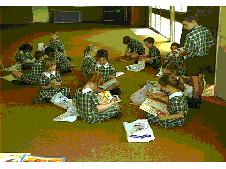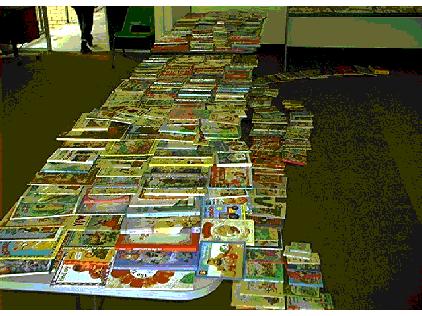 "A Children's Book Shuffle is a proven
free' community based book exchange activity suitable for
rural, regional and city communities, unitizing existing resources,
technology and providing a highly effective and efficient vehicle
for positive corporate promotion"
"A Children's Book Shuffle is a proven
free' community based book exchange activity suitable for
rural, regional and city communities, unitizing existing resources,
technology and providing a highly effective and efficient vehicle
for positive corporate promotion"
Where did the Book Shuffle concept come
from?
Many schools throughout the world undertake a range of book
collecting activities and the Children's Book Shuffle is an
innovative project based on sharing books within and between
communities. The Book Shuffle concept as developed inAustralia was
one outcome of my PhD early literacy research (1997-2001) at The
University of Queensland. In this longitudinal research I examined
issues surrounding the literacy development of children in 30
families. Part of the research focused on how families used books
at home from the time children started preschool to the end of Year
2. In looking at the changing number of books the research showed
that while all the families valued the books very highly, most
families reached a limit in the number of books they could use at
any one time.
What did the research find?
The research found that books usually arrived in homes as
birthday gifts, Christmas presents or as special gifts from
parents, other relatives or family friends. The patterns of books
leaving households typically occurred when parents sorted through
the home collection because of the need for more bookshelf space,
to give books to other families with younger children or to donate
books to charities or school fetes. While the number of books each
family had at home varied greatly typically this number ranged from
about 100 to 250 and thus children's books represented a
significant investment.



What is a Book Shuffle?
Essentially a Book Shuffle is a community activity whereby
families 'donate' there unwanted children's books into
a central pool (typically at a school/s). These books are checked
and stamped, to identify that they were donated to the Book
Shuffle. The books are then displayed and in an organized way
children view the collection and select a specific number of books
to take home to keep. The number of books being and average of the
total collected divided by the number of participants. A range of
related literacy activities are undertaken at the same time to
raise awareness of literacy and the importance of books at home and
at school. The accompanying pictures illustrate a Book Shuffle
underway at a primary school.
What did the pilot study find?
The pilot project was successfully completed at four suburban
primary schools in Brisbane, West End State School, Kelvin Grove
State College (Junior School), Somerset Hills State School and Holy
Family Catholic Primary School. The schools represented a range of
SES areas and were from both the government and private sectors.
The outcome of the pilot project was that literacy and books were
discussed and promoted in the homes and schools, and that unwanted
resources in terms of several thousand books at an estimated value
of $35 000.00 to $40 000.00 (in second hand books) were
'shuffled'. In addition the sponsors, The University of
Queensland and Snap Printing received a significant local and
broader publicity.
The Book Shuffle as a promotional tool
The pilot project received very positive coverage in both print
and electronic media in Queensland and elsewhere in Australia. UQ
NEWS December 11 described the activity as "A pilot project of
a simple idea to recycle unwanted children's books" (p.
12), while the Southern News detailed on December 13, how "The
trial involved parents donating books and the pupils choosing their
favourites to take home" (p. 12). There was a long segment
broadcast by Channel 9 inBrisbane showing the activity at one
school, the ABC radio broadcast a number of interviews.
I have also promoted the concept in Singapore on a visit there
in September 2001 and inCanada in July this year.
The several schools including the initial four pilot schools have
indicated an interested in continuing the project and a small
number have continued to annual Book Shuffles.
I believe the my research (1997-2001) and the pilot study
shows:
- the concept of a Book Shuffle works
- that school communities of different sizes, SES status and
systems can participate
- that larger organizations can use the Book Shuffle to
effectively promote their 'business' and public image in a
highly efficient and positive way
- the concept requires minimal community and or school resources
in terms of staff time and funds yet utilizes existing resources
(unwanted books at home)
- parents are more than happy to 'donate' unwanted books
from home to support other families in their local community
- at a local level business will support a Book Shuffle (as Snap
Printing did in the pilot project)
- that the Internet can be used to efficiently provide resources
to participation schools
- that different communities can support and participate in a Book
Shuffle and that groups within communities who have more book based
resources are happy to have their extra books 'Shuffled' to
another setting.
What needs to be done to make the Book Shuffle successful as a
larger scale project aimed at particular communities?
Given the success of the pilot project and the continuing
interest from schools I would like to be able to facilitate a
significantly larger project. Such a broader project could be
focused towards a) a limited number of rural communities where the
local township and all the local schools (government and private)
could participate collectively, and b) regional towns and specific
city communities where the collected resources could be shared
within schools and across schools within the local area.
As part of this plan the "Sponsors Name, Children's
Book Shuffle" would register schools or other interest groups
via the Internet. These schools and or other organizations would
then be supported by a resource package with other materials
provided on the Internet. In addition specific question and answer
support would be provided via a dedicated Email address.
The sponsors / promoters would have numerous opportunities to
present their corporate profile in the surrounding publicity, they
could incorporate their business mane into the Book Shuffle Logo
which in turn would go into each home and be highly visible as part
of t?e Internet support package.
If you wish to participate in developing the Book Shuffle as a
vehicle for promotion of your organization contact Dr
Worthington.
The model of the Book Shuffle has been promoted
inAustralia,Singapore andCanada. Since then a small number of
schools in Brisbane successfully conducted their own Book
Shuffles.
 "A Children's Book Shuffle is a proven
free' community based book exchange activity suitable for
rural, regional and city communities, unitizing existing resources,
technology and providing a highly effective and efficient vehicle
for positive corporate promotion"
"A Children's Book Shuffle is a proven
free' community based book exchange activity suitable for
rural, regional and city communities, unitizing existing resources,
technology and providing a highly effective and efficient vehicle
for positive corporate promotion"